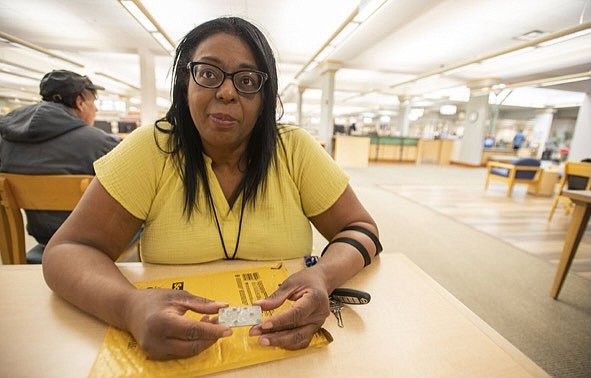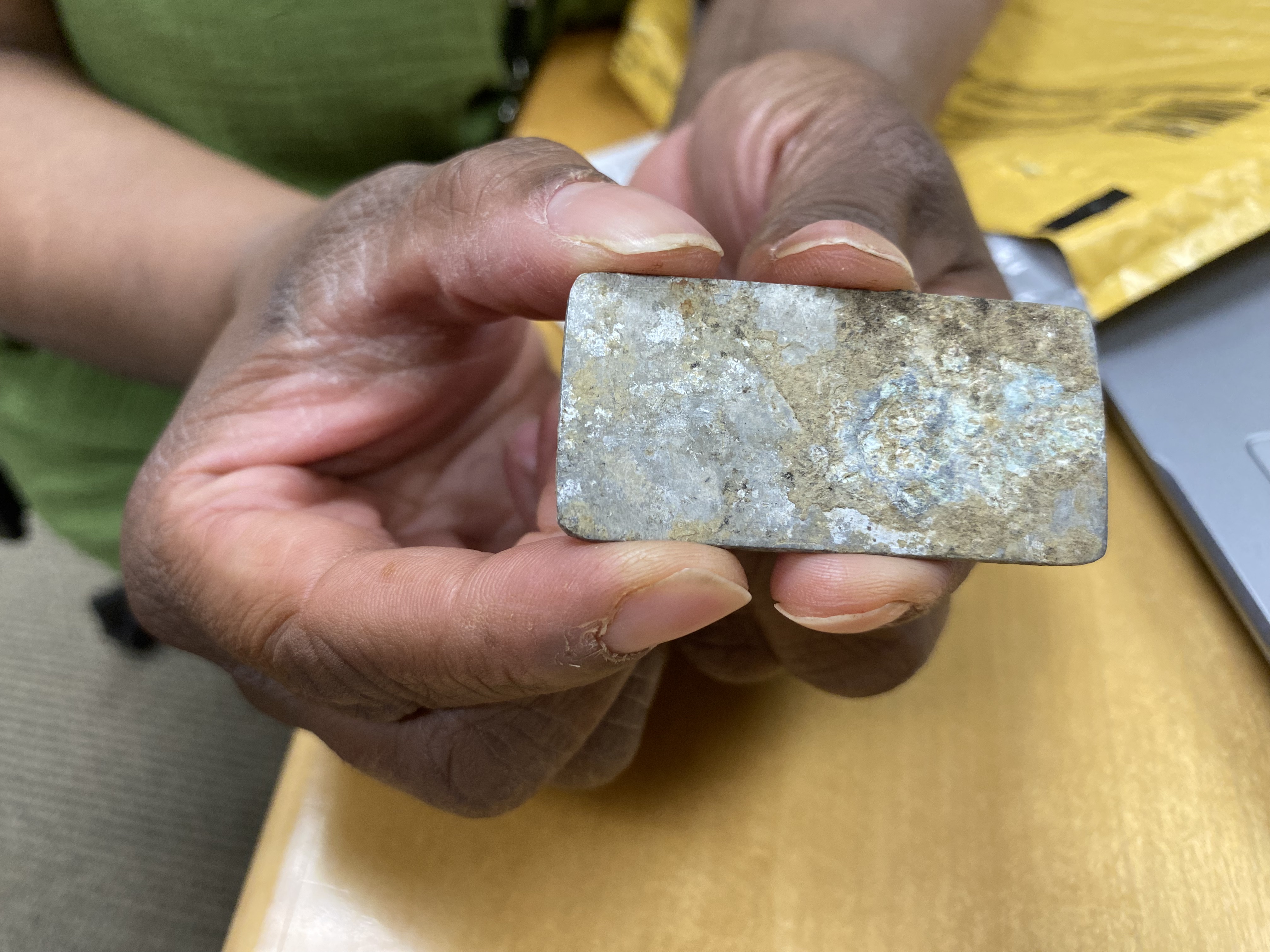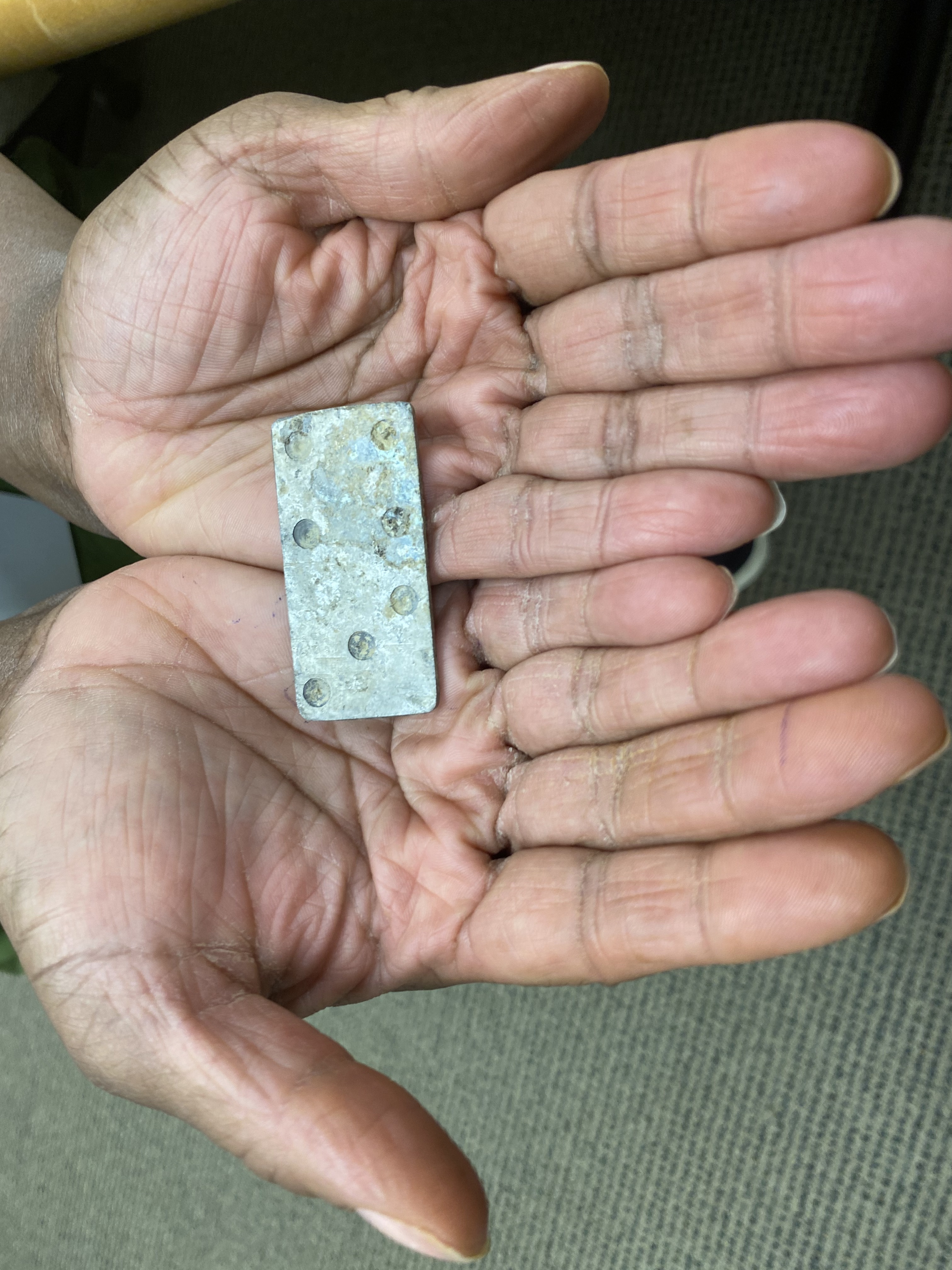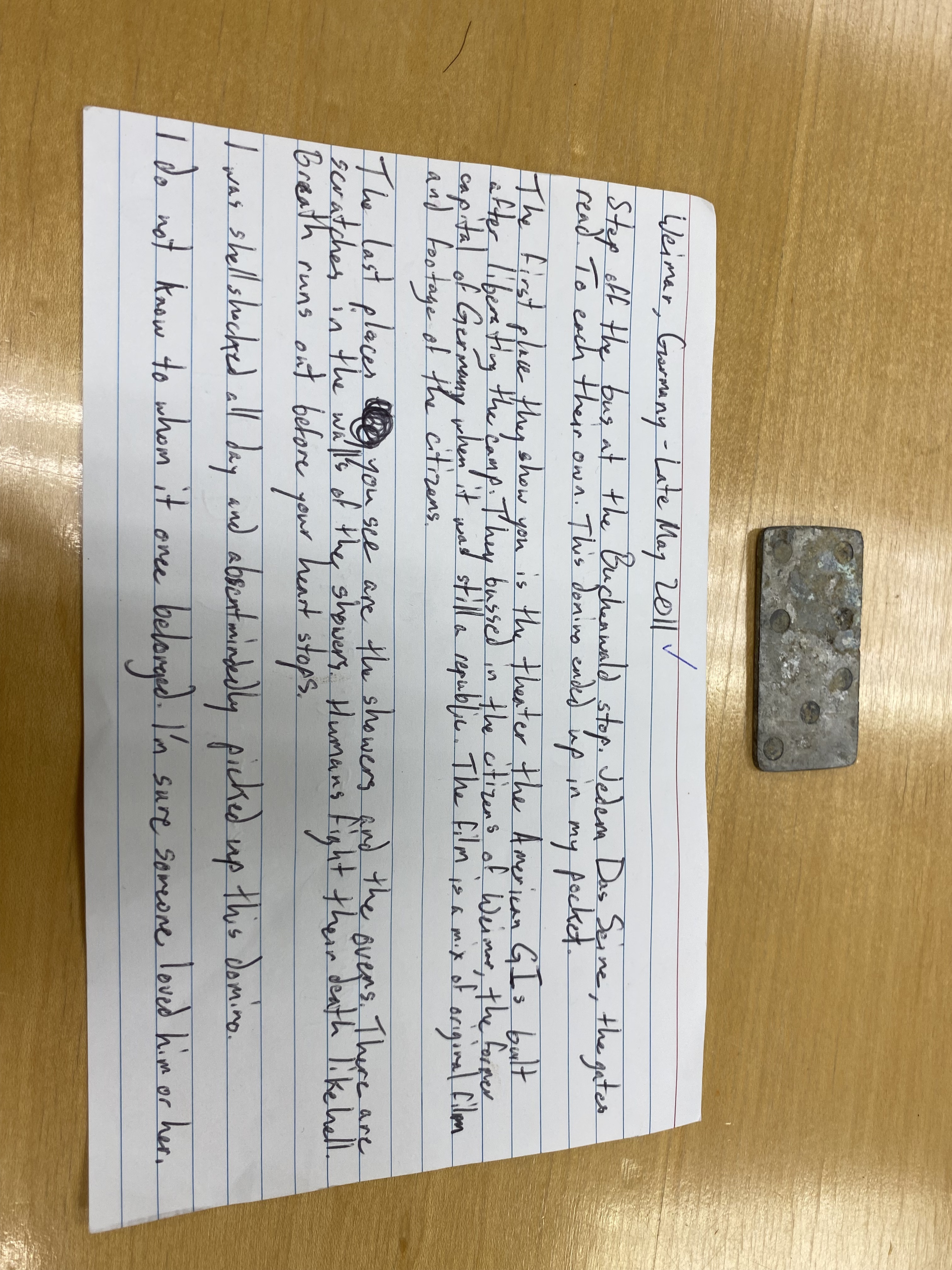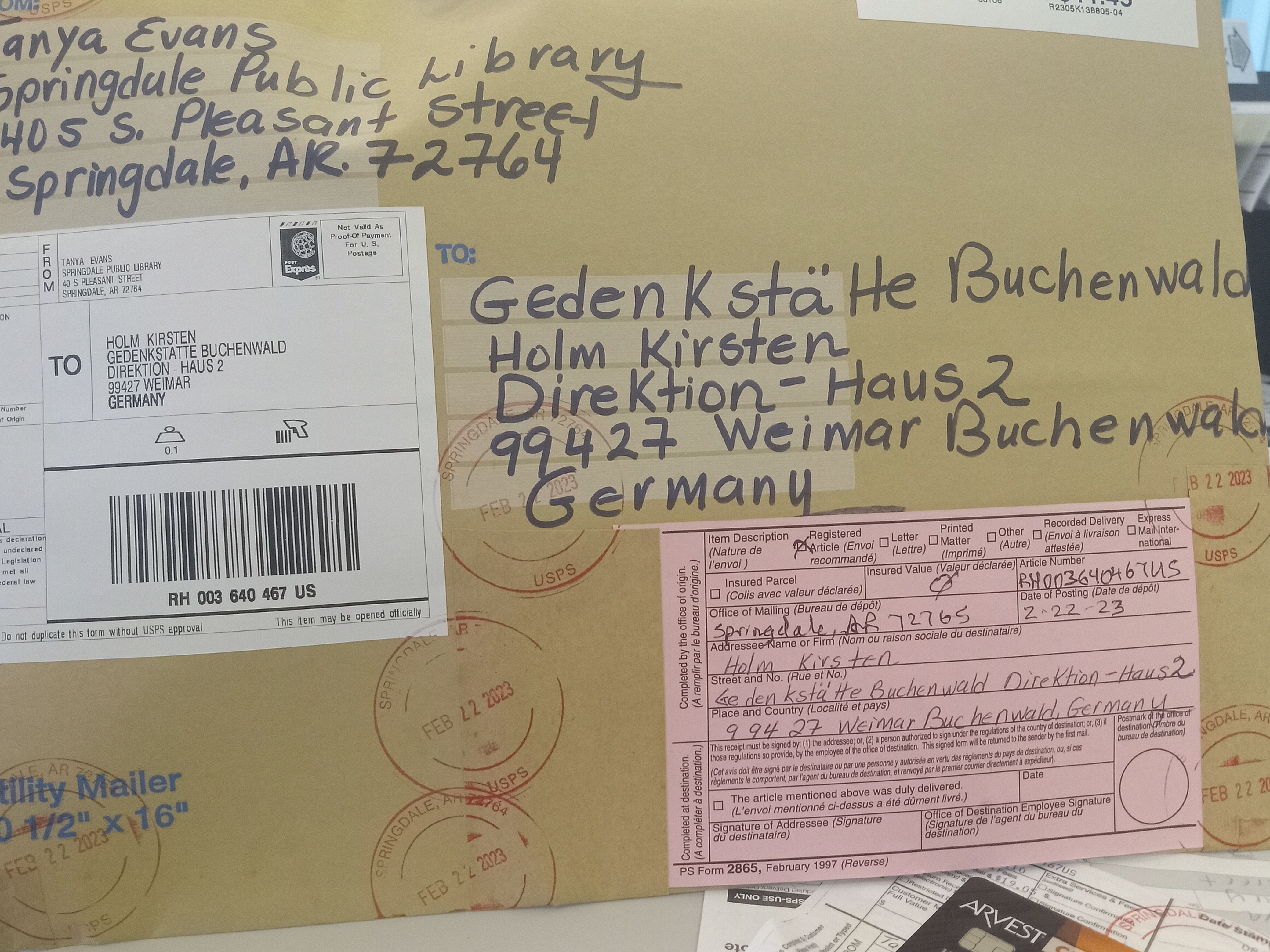A small piece of history made its way back home after a stop in Springdale.
Late last year, Tanya Evans, multicultural librarian at the Springdale Public Library, was getting ready for program called "The U.S. and the Holocaust: Immigration Then and Now," when she was called to help a patron.
"There was this gentleman. He had a question about dominoes and the Holocaust," Evans says. He handed her a small, metal domino and a note claiming it was from the Buchenwald Memorial Concentration Camp in Weimar, Germany. According to the note, the man absentmindly picked up the domino at the site and left with it.
Evans reached out to her collegue, Dr. Kevin Simpson, author of "Soccer Under the Swastika" and department chair of the department chair of psychology at John Brown University. They both serve on Arkansas Holocaust Education Committe.
"I asked him, 'Is there any way that we could authenticate this?'" Evans says. "We have a lot of people that come in here with a lot of strange stories. So Dr. Simpson took a picture of it. And he actually sent it to the Buchenwald."
Simpson discovered that it was, in fact, a piece from the Buchenwald Concentration Camp.
"It's exceedingly rare that you'll have these artifacts turn up," Simpson says. "From time to time, if there's maybe a storm (at) one of these camps or memorial sites, it kind of turns up things in the ground, and you might be walking along innocently and you find something."
He says he's not sure of the nature of this acquisition.
"I don't want to assume bad motives here, but when I reached out to the director of collections, he made it pretty clear that this was likely taken without the awareness of some of the staff there," Simpson says.
Simpon's academic work has taken him to many Holocaust memorial sites throughout Ukraine, Poland, France, Germany, Austria, and the former Czechoslovakia. He says that it's common for guests to explore those sites without a tour guide.
Nonetheless, both he and Evans felt that there is a moral obligation to return the artifact, rather than keep it at the Springdale Public Library.
"There is an obligation to leave it in place because it's both a historical artifact, but it also represents the human tragedy that is the Holocaust," he says of artifacts such as this one. "They represent sometimes a prisoner's effort to communicate with the outside world, or to just memorialize their experience, or in this case, it's a way to create a diversion. In other words, these are games that prisoners would create for themselves," Simpson says.
The domino resembled others found at the site and was likely constucted out of scrap metal at Buchenwald Concentration Camp, which was one of the largest forced labor concentration camps in Germany, according to the United States Holocaust Memorial Museum's online encyclopedia.
While there are no exact records, it is estimated that the SS imprisoned nearly 250,000 people -- more than the population of Springdale -- from across Europe. Prisoners included Jews, Sinti and Roma (gypsies), political prisoners, Jehovah's Witnesses, German military defectors, homosexuals and people with disabilites.
In anticipation of allied forces liberating the camp, prisoners actually stormed the watchtowers and seized control of Buchenwald on April 11, 1945. An estimated 21,000 people were liberated.
"I was wondering what the reaction was going to be from the museum," Simpson says. "They take it very personally when artifacts leave the premises. Every once in a while you'll hear a story at Auschwitz, where some materials are looted"
He says the most famous case is the gate at Auschwitz with the phrase, "Arbeit macht frei," which translates as "work sets you free." Simpson says that these sort of artifacts have has value on the black market.
"It's also been documented that neo Nazi groups will sometimes take these materials from camps and sell them or try to do something kind of sinister with them," he adds. "That's why the the memorials and the museums take these issues so seriously."
The domino that found its way into Evans' hands arrived safely back to Buchenwald on March 20, Kirsten Holm, head of the historical collection of the Buchenwald Memorial Concentration Camp, confirmed by email.
Simpson says that memorials such as the Holocaust Memorial Museum in Washington, D.C., place an emphasis on using artifacts to teach history as the survivors are dying off. As time moves on, it's harder for students, even in Simpson's classes, to grasp the seriousness of something that isn't so far in the past. To some students, it feels as far away as the Revolutionary War, he says. Artifacts, however, offer a tangible bridge to the past.
"It's a way to bridge the gap because we're talking about basically 75 years since the end of the war, to bridge the gap between their lives and our lives," Simpson says. "That's why I think it's so useful for when we teach about this history, something that they could quite literally put their hands on."
You might recognize Buchenwald if you've ever read Elie Wiesel's book 'Night,' a book often required in high school history, social studies and literature classes. This is a way for them to understand more of the American connection.
Wiesel was imprisoned in Auschwitz, where his mother and sister were killed. Then he and his father were part of the death march to Buchenwald in 1945 while Wiesel was still a teenager. His memoir in Yiddish, "Night,' shortened from "un di velt hot geshvign" meaning "and the world has remained silent" is one of the most widely read works about the Holocaust.
Wiesel spent his life educating others about the atrocities committed by Nazis in the hope of protecting future generations from repeating the mistakes of the past. He was awarded the Nobel Prize for Peace in 1986. The author gave a talk at the Walton Arts Center in 2012. He died in 2016 at the age of 87.
It's possible that Wiesel played games on Sundays with a set of dominoes made there by the prisoners.
"They generally didn't work them on Sunday -- the inmate slave laborers -- Sunday was sort of their leisure day," Evans says. "I just wondered was this like a Sunday domino [game] when they had some downtime? The prisoners would cut each other's hair, they would delouse each other and engage in the game of dominoes. Because, you know, you're still dealing with human beings in the most miserable situation you can ever manage, but this affirms their humanity, that they needed a diversion.
"If it hadn't been for Dr. Simpson, I would have just stuck this in my desk drawer and just kept on doing what I do. But I was really happy that he took the time to make the connection with the museum in Germany," she says.
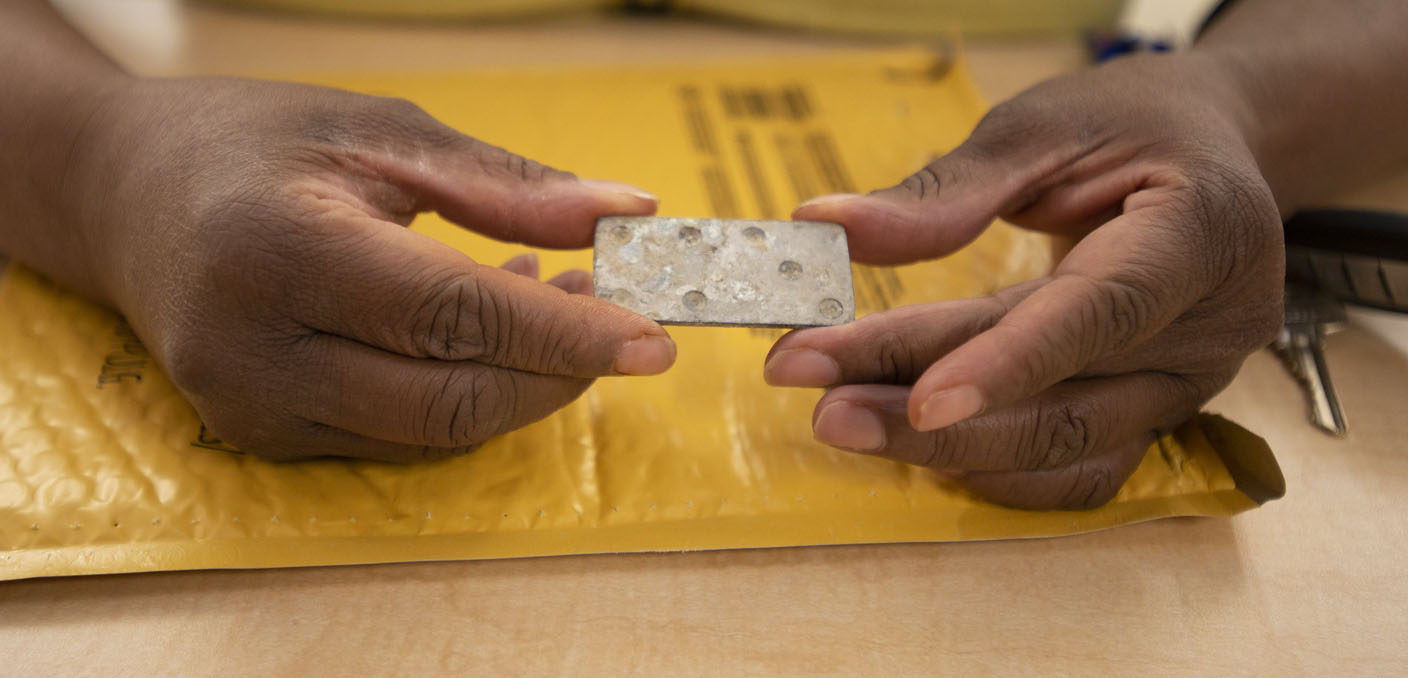 Tanya Evans, multicultural librarian at the Springdale Public Library, holds a handmade domino Tuesday Feb. 21, 2023. The domino was given to her by a library patron who claimed that he stole from the Buchenwald Concentration Camp. Evans is sending it back to the museum in Weimar, Germany for their collection. Visit nwaonline.com/photo for today's photo gallery. (NWA Democrat-Gazette/J.T. Wampler)
Tanya Evans, multicultural librarian at the Springdale Public Library, holds a handmade domino Tuesday Feb. 21, 2023. The domino was given to her by a library patron who claimed that he stole from the Buchenwald Concentration Camp. Evans is sending it back to the museum in Weimar, Germany for their collection. Visit nwaonline.com/photo for today's photo gallery. (NWA Democrat-Gazette/J.T. Wampler)
